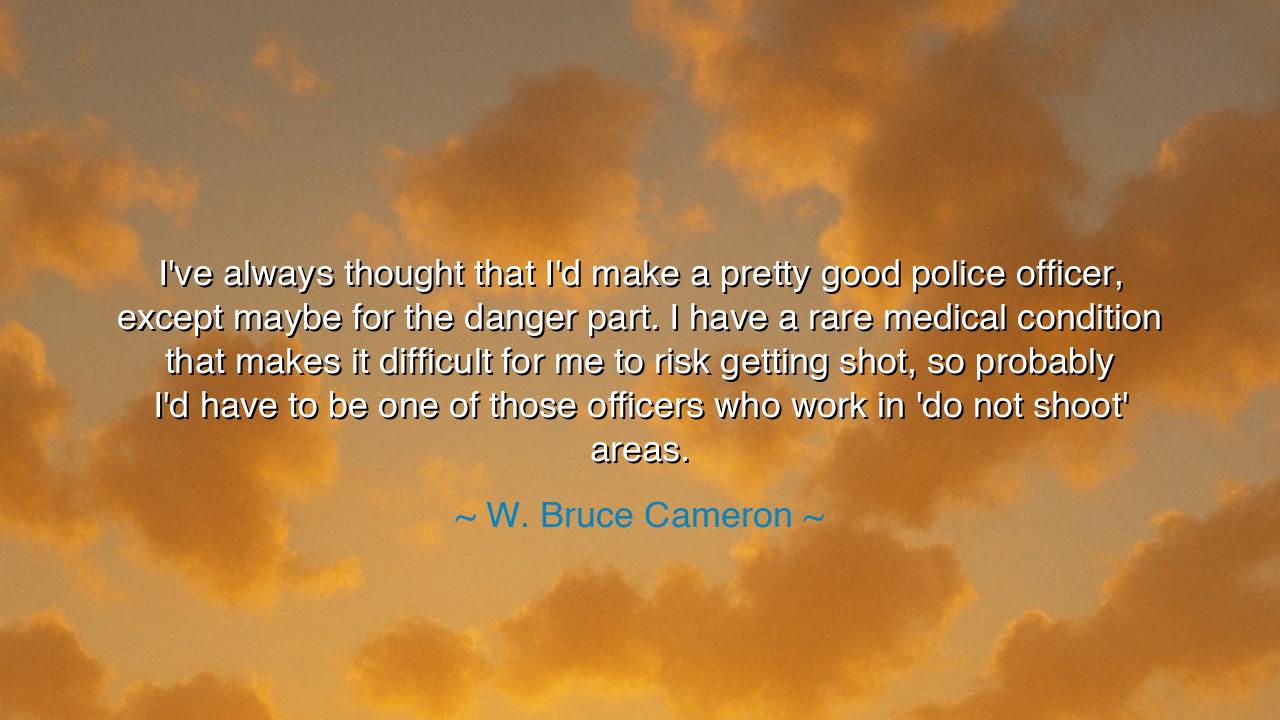
I've always thought that I'd make a pretty good police officer
I've always thought that I'd make a pretty good police officer, except maybe for the danger part. I have a rare medical condition that makes it difficult for me to risk getting shot, so probably I'd have to be one of those officers who work in 'do not shoot' areas.






Hear the words of W. Bruce Cameron, spoken with humor, yet carrying within them a profound truth: “I've always thought that I'd make a pretty good police officer, except maybe for the danger part. I have a rare medical condition that makes it difficult for me to risk getting shot, so probably I'd have to be one of those officers who work in 'do not shoot' areas.” At first, this sounds lighthearted, but beneath the laughter lies the eternal human struggle with vocation, limitation, and courage. He speaks of the longing to serve, the recognition of personal weakness, and the wisdom to balance the two.
The origin of this reflection lies in the tension between aspiration and reality. Many are drawn to the nobility of professions like that of the police officer, where one stands as guardian of peace, defender of the vulnerable, and shield against chaos. Yet, these callings come with risk—the ever-present shadow of danger. Cameron, with self-deprecating wit, admits that his medical condition bars him from such risk. By doing so, he teaches that every soul must reckon honestly with what their body and circumstance allow, even as their spirit yearns for higher service.
The ancients knew this conflict well. In the armies of Sparta or Rome, not all could stand in the phalanx. Some lacked strength, others bore wounds or frailty. Yet those who could not fight were not without worth—they became keepers of knowledge, builders of supply, planners of strategy. The polis, the community, understood that service takes many forms, and that even those who could not wield the sword could still defend the city. Cameron’s words, though veiled in humor, echo this truth: there are many ways to serve, even for those who cannot face danger directly.
Consider the story of Franklin Delano Roosevelt, stricken by polio and bound to a wheelchair. His medical condition prevented him from fighting on battlefields, yet his leadership carried America through Depression and war. He could not risk his body as a soldier, but he risked his soul as a statesman, taking upon himself the burdens of an entire nation. His example reminds us that our limitations do not define our value—they redirect us toward other forms of service, often just as vital, often even greater.
The meaning of Cameron’s words is therefore layered. On the surface, it is jest: a man joking about a "do not shoot" zone. Yet, beneath, it is wisdom: that one must discern not only what one desires, but what one can truly endure. It is not cowardice to admit limitation—it is courage to face it honestly. And it is wisdom to then seek a place where one’s gifts may still be used in service to others.
The lesson for us is this: every person has a calling, but not all callings are alike. Do not despise your limitations, but let them shape your path. If you cannot serve in danger, serve in counsel. If you cannot labor with hands, labor with words. If you cannot run at the front, guide from behind. The worth of a life is not measured by whether it fits one mold, but by whether it fulfills the deeper purpose of service and love.
Practical action follows: reflect honestly on your strengths and weaknesses, and do not be ashamed of the latter. Find ways to serve that align with your condition, your skills, your circumstance. Support those who face dangers you cannot, offering them respect and gratitude. And when you find yourself tempted to mock your own limits, as Cameron does with humor, remember that self-acceptance is a form of strength, and laughter itself can be a way of serving the world.
Thus Cameron’s words endure not merely as comedy, but as teaching. They remind us that even those who cannot walk the most perilous paths still have a role in building a just and safe society. Let us, then, embrace both our desires and our limits, knowing that service has many faces, and that every contribution—whether on the battlefield, in the ward, or in the "do not shoot" zones of life—adds to the great work of humanity.






AAdministratorAdministrator
Welcome, honored guests. Please leave a comment, we will respond soon